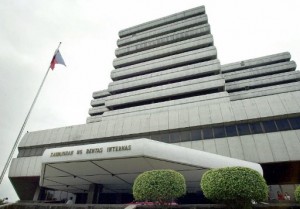The Bureau of Internal Revenue has been tasked to zero in on the value-added tax payments of large corporations as the weak collections in 2013 indicated that the VAT could be the most evaded tax.
The Department of Finance showed in a report that VAT collection from large corporate taxpayers grew at an annual pace of 6 percent last year to P152 billion.
Finance Secretary Cesar Purisima said that while there was an increase in VAT collection, the pace was much slower compared with the 9.2-percent nominal growth rate of the economy last year.
“Clearly, there is room for growth in VAT collections because, ideally, VAT collection should be growing by almost the same pace as the economy,” Purisima told reporters.
Last year, the Philippines remained one of the fastest-growing economies in Asia. The country’s economic growth was driven partly by robust consumption, which was aided by remittances from overseas Filipinos.
The VAT, currently set at 12 percent, is a consumption tax that an individual or a corporation pays every time a consumption of a good or a service is made.
Purisima said the foregone revenues from suspected evasion of VAT could be largely accounted for by large corporate taxpayers because the total VAT collection of the BIR, including those remitted by smaller enterprises and individuals, grew at an annualized pace of 9 percent to P250 billion.
With this backdrop, Purisima said the BIR has been directed to conduct an audit of large corporate taxpayers and pay special attention to their VAT payments.
Taxes imposed on large corporate entities are collected by a special unit in the BIR called the Large Taxpayers Service (LTS).
Purisima said the LTS has been ordered to use third-party sources to verify tax compliance of large corporate entities.
At present, there are about 2,000 corporations being serviced by the LTS. Purisima said the number was small and that there could be about 2,000 more entities that should already be considered large taxpayers because of their high profits, but were not remitting the proper taxes.
Under the BIR’s rules and regulations, a corporate entity is considered a large taxpayer if it meets a combination of the following criteria: quarterly VAT payment of at least P200,000, quarterly percentage tax payment of at least P200,000, annual excise tax payment of at least P1 million, annual income tax payment of at least P1 million, annual withholding tax remittance of at least P1 million, and annual documentary stamp tax payment of at least P1 million.
Purisima said plugging the potential leakage in VAT collection could help the government achieve its revenue targets.
For 2014, the BIR, which accounts for about 60 percent of the national government’s revenues, is tasked to collect P1.46 trillion. Last year, the BIR collected P1.22 trillion, which was up by 15 percent from its 2012 collections but short of its target for the year.


